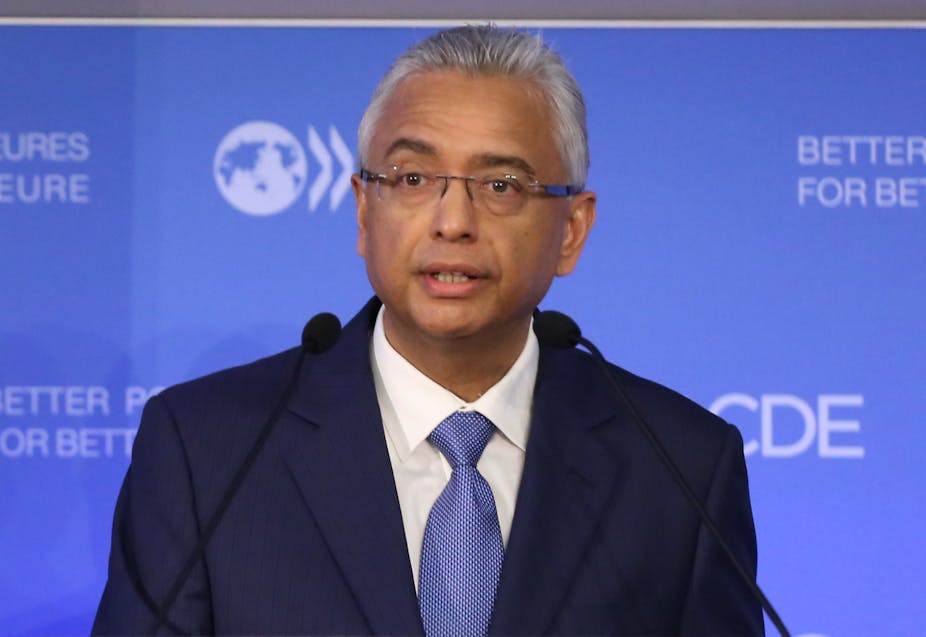Mauritius has elected the incumbent, Pravind Kumar Jugnauth, as prime minister. His Militant Socialist Movement won a comfortable majority in the election on November 7, 2019. Moina Spooner from The Conversation Africa asked Roukaya Kasenally for insights into how Jugnauth clinched the win.
Who is Pravind Kumar Jugnauth and how did he come to power?
Pravind Kumar Jugnauth became Mauritius’ prime minister in January 2017, when his father, Sir Anerood Jugnauth, stepped down. Sir Anerood held the post of prime minister three times, totalling more than 18 years. He was also appointed the president of Mauritius (a mostly ceremonial position) in 2003.
Even though the father-to-son transition is constitutionally allowed, it has raised concerns about dynastic politics. Pravind Jugnauth is now the fifth prime minister of independent Mauritius, however all but one prime minister have come from two families: the Ramgoolams or Jugnauths. The Ramgoolams have been at the helm of the Mauritius Labour Party; the Jugnauths founded and led the Militant Socialist Movement.
This concentration of power does not augur well for the often celebrated image of Mauritius as Africa’s shining democratic model.
Anerood Jugnauth is often referred to as the father of the Mauritian economic miracle. Under his leadership the island experienced an unprecedented economic boom as a result of policies which supported export-oriented manufacturing (mainly textiles), sugar, and tourism.
But a number of concerns have been raised about the manner in which cronyism has been practised by successive regimes. This has had an often detrimental effect it has on the management of key institutions such as the state trading corporation, or the central electricity board. These are sometimes staffed with close kin or political backers, regardless of their skill base.
The party won the 2019 election by a comfortable majority. What could account for this?
It was a snap election and the campaign was short and intense. Jugnauth’s Militant Socialist Movement is one of the three major political parties in Mauritius and is said to espouse centre left politics. Its electoral base is essentially from the Hindu community, which accounts for about half of the island’s population.
The Militant Socialist Movement contested the election in coalition with smaller parties under the banner “Alliance Morisien”. The coalition bagged around 63% of the seats in parliament but scored 37% in the popular vote. The coalition led by the Mauritius Labour Party got 22% of the electable seats and 34% of the popular vote. The Mauritian Militant Movement won 13% of the seats and 20% of the popular vote.
The discrepancy between seats won and popular vote is due to the current electoral model: “first past the post”. In this model a simple majority is required to be elected which means it can crowd out smaller parties and independent candidates.
The Militant Socialist Movement’s win can be attributed to a combination of factors.
First, Pravind Kumar Jugnauth’s government introduced key measures such as the minimum wage and increased pensions for the elderly. It also brought changes to the labour law (enacting the Workers’ Rights Act) and made education in public universities free.
His government also oversaw some important infrastructure projects, such as the first phase of the Light Railway Project, which will pass through five towns. People could see and relate to such outcomes. Although Pravind Jugnauth was prime minister for only two years of the previous five year mandate, he is lauded for initiating the railway project, which the previous government failed to get moving.
Jugnauth’s election win also owes something to the power of incumbency. For example, his party used the state media extensively.
But it should also be highlighted that, since the announcement of the results, the opposition and civil society organisations have voiced concerns over what they view as a number of irregularities. These range from a significant number of voters that were unable to vote, marked ballot papers discovered after voting outside counting centres and the inexperience of staff recruited to work during the election. The opposition is now filing a case on this in the Supreme Court. This is the first time election results in Mauritius have faced such grave contestation since the country’s independence.
What are the challenges Jugnauth faces in his next tenure?
The major and immediate challenge will be economic.
The sugar and textile sectors are in the danger zone. Once the pillars of the Mauritian economy, they have dwindled in importance due to the phasing out of all forms of protected and preferential markets.
To deal with this, and improve its status to that of a high income economy, the country is already trying to promote other areas such as the knowledge economy, artificial intelligence and the ocean economy. These are entirely new areas which will require new sets of skills and knowledge and a new ecosystem.
One of the major concerns of Pravind Jugnauth’s government is to contain the public debt. It currently stands at 65%, driven by infrastructure projects and the injection of public capital into two faltering banks. And the election campaign contained promises that will add large costs. They included a 42% increase in pensions and a review of pay and grading conditions for public sector workers, who make up more than 45% of the Mauritian workforce.
In addition, the government needs to pay attention to rising inequality and the high (25%) level of unemployment among the youth.
Does dynastic politics have a future if it can’t deliver on election promises?
The leaders of the Mauritian Militant Movement and the Mauritius Labour Party are ageing and there is no real competition for their positions. The only political leader who is relatively young is Pravind Jugnauth (57) and he is likely to remain the uncontested leader of the Militant Socialist Movement for years.
One must ask what is meant by electoral promises. Does it mean a catalogue list of populist measures or a serious discussion around the forging of a social contract with the citizens?
The article was updated to include concerns over voting irregularities

